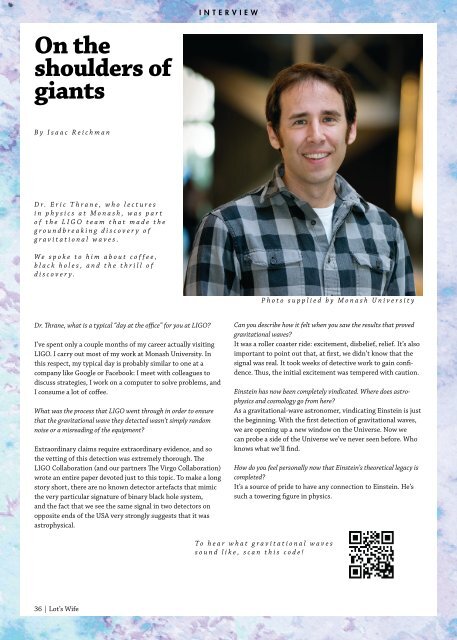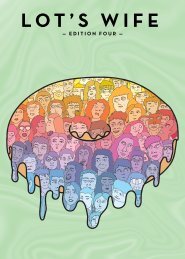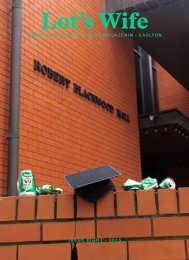Lot's Wife Edition 2 2016
You also want an ePaper? Increase the reach of your titles
YUMPU automatically turns print PDFs into web optimized ePapers that Google loves.
On the<br />
shoulders of<br />
giants<br />
INTERVIEW<br />
By Isaac Reichman<br />
Dr. Eric Thrane, who lectures<br />
in physics at Monash, was part<br />
of the LIGO team that made the<br />
groundbreaking discovery of<br />
gravitational waves.<br />
We spoke to him about coffee,<br />
black holes, and the thrill of<br />
discovery.<br />
Photo supplied by Monash University<br />
Dr. Thrane, what is a typical “day at the office” for you at LIGO?<br />
I’ve spent only a couple months of my career actually visiting<br />
LIGO. I carry out most of my work at Monash University. In<br />
this respect, my typical day is probably similar to one at a<br />
company like Google or Facebook: I meet with colleagues to<br />
discuss strategies, I work on a computer to solve problems, and<br />
I consume a lot of coffee.<br />
What was the process that LIGO went through in order to ensure<br />
that the gravitational wave they detected wasn’t simply random<br />
noise or a misreading of the equipment?<br />
Extraordinary claims require extraordinary evidence, and so<br />
the vetting of this detection was extremely thorough. The<br />
LIGO Collaboration (and our partners The Virgo Collaboration)<br />
wrote an entire paper devoted just to this topic. To make a long<br />
story short, there are no known detector artefacts that mimic<br />
the very particular signature of binary black hole system,<br />
and the fact that we see the same signal in two detectors on<br />
opposite ends of the USA very strongly suggests that it was<br />
astrophysical.<br />
Can you describe how it felt when you saw the results that proved<br />
gravitational waves?<br />
It was a roller coaster ride: excitement, disbelief, relief. It’s also<br />
important to point out that, at first, we didn’t know that the<br />
signal was real. It took weeks of detective work to gain confidence.<br />
Thus, the initial excitement was tempered with caution.<br />
Einstein has now been completely vindicated. Where does astrophysics<br />
and cosmology go from here?<br />
As a gravitational-wave astronomer, vindicating Einstein is just<br />
the beginning. With the first detection of gravitational waves,<br />
we are opening up a new window on the Universe. Now we<br />
can probe a side of the Universe we’ve never seen before. Who<br />
knows what we’ll find.<br />
How do you feel personally now that Einstein’s theoretical legacy is<br />
completed?<br />
It’s a source of pride to have any connection to Einstein. He’s<br />
such a towering figure in physics.<br />
To hear what gravitational waves<br />
sound like, scan this code!<br />
36 | Lot’s <strong>Wife</strong>

















